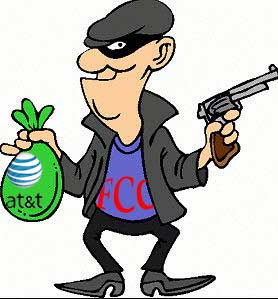 I had seen the reports on the FCC’s decision to levy a record $100 million fine against AT&T for allegedly slowing data speeds on their unlimited data plans, which no longer exist. I do not know whether AT&T is guilty of this claim, the company claims it is innocent, but I do know it is not the job of the government to fine them over a contract dispute.
I had seen the reports on the FCC’s decision to levy a record $100 million fine against AT&T for allegedly slowing data speeds on their unlimited data plans, which no longer exist. I do not know whether AT&T is guilty of this claim, the company claims it is innocent, but I do know it is not the job of the government to fine them over a contract dispute.
The proper course of action would be for AT&T’s customers to file a class action lawsuit against the company. This is done all the time and if there was an actual case to be made, there would be law firms eager to take on the case. This is exactly what the courts are for, to arbitrate such disputes. Indeed, the government apparently knows this as the FTC filed suit against AT&T over this same issue last year. I don’t believe it is the government’s place to file suit either, but at least it is the proper method to resolve such an issue.
What really grabbed my attention though was how this story was reported on the CBS This Morning today. The correspondent being interviewed, Mellody Hobson, about the case made a couple of statements that revealed that this isn’t about “protecting the consumer” as some might claim, but is rather about strengthening government control.
First, when Mellody was asked about the lawsuit by the FTC and how it compared to the fine from the FCC. She stated that while both were centered on the same issue, the difference really is what happens to the money. If the FTC is successful in its lawsuit, any money received would go to AT&T customers who had been affected. If the FCC succeeds in levying this fine, the money goes to the Treasury. So, despite claims to the contrary, the FCC action has nothing to do with protecting the consumer as the money is not going to compensate them for any supposed damage they suffered and the plans for which AT&T are being fined no longer exist.
So what then is the reason for the fine? This is where the other point from Mellody Hobson comes in. She stated:
The FCC understands the industry is under major consolidation. A lot of companies are trying to buy each other and they are flexing, they are making it clear who is in charge. As one board member said, they are going to slap these companies around to get concessions and assurances to show they are fighting for the little guy, the consumer.
In this particular case, while AT&T has said publicly that they will fight the fine, Ms. Hobson’s sources said that behind the scenes they will likely negotiate with the FCC and pay all or most of the fine. Why would AT&T pay such a huge fine if they are innocent as they claim? Because they are seeking to acquire DirectTV which requires regulatory, i.e. FCC, approval and they likely fear, rightly, that if they fight too hard against the fine this approval will be denied. (I won’t go into all the things wrong with the fact that they even have to seek such approval.)
This action on the part of the federal government, the attempt to “slap these companies around” and show them who is boss, is no different than the thug who pulls a gun on you on a darkened street and says, “Your money or you life,” or the well-dressed mobster who approaches a local business owner and tells him, “This is a nice place you have here, it’d be a shame if something happened to it.” Extortion is extortion and the fact it is being done by the government doesn’t make it any less so.
